
Innocence
Organized and co-curated by Alexandra Symons Sutcliffe and Justin Polera, assisted by Alexander Swanson
Assistant to Directors: Henriette Zimmermann
Project Management: Caterina Nicolini, Halil Gagam, Mathis Euvrard
With the generous support of Till-Oliver Kalähne and Peter Obstfelder.
April 26th-June 4th
Opening: April 26th, Friday, 18:00-23:00
“Composure is the least innocent of all virtues.” Adam Phillips.
In the Ulrike Meinhof and Eberhard Itzenplitz television drama Bambule (1970), the rebellion of the girls held in a reform centre and sadistic cruelty of the nuns and state officials who discipline them is depicted as a somatic hysteria. Violently unsettled, Bambule is a metric to the political discontent that drove Meinhof, Andreas Baader, Gudrun Ensslin and their followers to form the Red Army Faction and carry out acts of domestic terrorism. While it is polemic to show a work by a member of the RAF under the title Innocence, this exhibition makes no claims for the blamelessness (or otherwise) of Meinhof, or any of the artists included or subjects depicted; rather, it is the condition and function of innocence that is on trial.
Drawing on the psychoanalyst Christopher Bollas' theory of "violent innocence," this exhibition brings together time-based media, documentary, and sculptural works that play on the movement between the personal interior and wider political contexts. Bollas’ study of the violent innocent argues that innocence is produced through denial and exclusion of the other in order to maintain the sovereign boundaries of oneself. Framed and introduced by his reading of Arthur Miller’s play The Crucible in which Miller dramatizes the Salem witch trials as a critique of the Joseph McCarthy’s persecution of Communists in 1950s America, Bollas writes, “The violent innocent sponsors the affective and ideational confusion in the other, which he then disavows the knowledge of- this being the true violation.” The violation is of the possibility of co-existing difference and the right to a non-contingent autonomy--this is emotional imperialism.
Because we do not comprehend each other, we must invent one another, and through doing so we invent the boundaries and hierarchies of interpersonal and social form. There is no innocence, just the ceremony: the performance and the ritual, the frame and the stage. Innocence is a legal and social category. Children at play are innocent through the adult lens not because they are without politics and desire, but because the adult diminishes and miniaturizes the child world, making whole lives a proof for adult rationality and superiority. Likewise, history infantilizes the failures of past political rebellions to prove the inevitability of the current political climate, yet it is the only victor that can claim political innocence.
The occasion of the Innocence exhibition is PS120’s first anniversary, which coincides with Berlin Gallery Weekend. The core of the argument of the Innocence exhibition is rooted in contemporary German identity, acknowledging Berlin as the capital of permissive European Liberalism, and also acknowledging that this space is produced at the expense of others. The Innocence exhibition documents and unravels the civic and psychological states of innocence. The contexts and specificities of each artwork vary and contradict one another, and we ask you to look at yourself as much as at them. As Bollas writes, “If a subject denies perception, he does so because it bothers him.”
Innocence ist eine Ausstellung mit Werken von: Ulrike Meinhof und Eberhard Itzenplitz, Leonie Nagel, Martha Rosler, Annette Kelm, Esper Postma und Maurits Koster, Jumana Manna, Kasia Fudakowski, Marina Pinsky und Tobias Madison.
Performances bei der Eröffnung von: Monilola Ilupeju und Womanman ft. Alex Rathbone.
"Gelassenheit ist die am wenigsten unschuldige aller Tugenden." Adam Phillips.
In Ulrike Meinhofs und Eberhard Itzenplitz’s Fernsehdrama 'Bambule' (1970) werden die Rebellion der Mädchen, die in einem Reformzentrum festgehalten werden, und die sadistische Grausamkeit der Nonnen und Staatsbeamten, die sie disziplinieren, als somatische Hysterie dargestellt. Gewaltvoll unruhig ist 'Bambule’ ein Maß für die politische Unzufriedenheit, die Meinhof, Andreas Baader, Gudrun Ensslin und ihre Anhänger dazu gebracht hat, die Rote Armee-Fraktion zu bilden und Terrorakte durchzuführen. Während es polemisch ist, ein Werk eines Mitglieds der RAF unter dem Titel 'Innocence’ (dt.: Unschuld) zu zeigen, erhebt diese Ausstellung keinen Anspruch auf die Schuldlosigkeit (oder ähnliches) von Meinhof oder eine*r der ausgestellten Künstler*innen oder dargestellten Themen. Vielmehr sind es Bedingung und Funktion von Unschuld, die hier auf dem Prüfstand stehen.
In Anlehnung an die Theorie des Psychoanalytikers Christopher Bollas von "gewalttätiger Unschuld" vereint diese Ausstellung zeitbasierte Medien und dokumentarische, sowie skulpturale Arbeiten, die auf die Dynamik zwischen dem persönlichen Inneren und weiteren politischen Kontexten anspielen. In Bollas' Studie des gewalttätig Unschuldigen wird argumentiert, dass Unschuld durch Leugnung und Ausschluss des Anderen hervorgerufen wird, um die souveränen Grenzen des eigenen Menschen zu wahren. Eingeführt durch seine Lesung von Arthur Millers Theaterstück 'The Crucible', in dem letzterer die Hexenprozesse von Salem als Kritik an Joseph McCarthy’s Verfolgung der Kommunisten im Amerika der 50er Jahre dramatisiert, schreibt Bollas: "Der gewalttätige Unschuldige unterstützt die affektive und ideelle Verwirrung im Anderen, dessen er dann die Erkenntnis verweigert - das ist die wahre Verletzung. “Die Verletzung besteht in der Möglichkeit nebeneinander bestehender Unterschiedlichkeiten und in dem Recht auf eine bedingungslose Autonomie - das ist emotionaler Imperialismus.
Weil wir uns nicht verstehen, müssen wir uns gegenseitig erfinden, und dadurch erfinden wir die Grenzen und Hierarchien der zwischenmenschlichen und sozialen Form. Es gibt keine Unschuld, nur die Zeremonie, die Aufführung und das Ritual, den Rahmen und die Bühne. Unschuld ist eine rechtliche und soziale Kategorie. Kinder, die spielen, sind durch die Linse des Erwachsenen unschuldig, nicht weil sie ohne Politik und Sehnsucht sind, sondern weil der Erwachsene die Kinderwelt mindert und verkleinert, wodurch ganze Leben zu einem Beweis für die Rationalität und Überlegenheit des Erwachsenen werden. In derselben Weise infantilisiert Geschichte die Misserfolge vergangener politischer Aufstände, um die Unausweichlichkeit des gegenwärtigen politischen Klimas zu rechtfertigen, wobei letzteres doch der einzige Sieger ist, der politische Unschuld für sich beanspruchen kann.
Anlass der Innocence-Ausstellung ist das erste Jubiläum von PS120, das mit dem Berlin Gallery Weekend zusammenfällt. Der Kern der Thematik der Innocence-Ausstellung wurzelt in der zeitgenössischen deutschen Identität, die Berlin als Hauptstadt des freizügigen europäischen Liberalismus anerkennt und auch anerkennt, dass dieser Raum auf Kosten anderer produziert wird. Die Innocence-Ausstellung dokumentiert und enthüllt die bürgerlichen und psychologischen Zustände von Unschuld. Die Kontexte und Besonderheiten jedes Kunstwerks variieren und widersprechen einander, und wir bitten Sie, genauso wie sie sich selbst zu betrachten. Wie Bollas schreibt: "Wenn ein Subjekt die Wahrnehmung ablehnt, tut es dies, weil es ihn stört."
Text by Alexandra Symons Sutcliffe
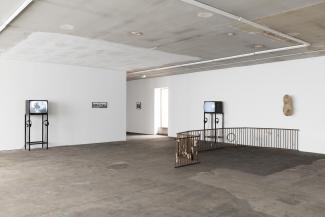
Innocence, Installation view. Works by Kasia Fudakowski, Ulrike Meinhof and Eberhard Itzenplitz, and Jumana Manna.
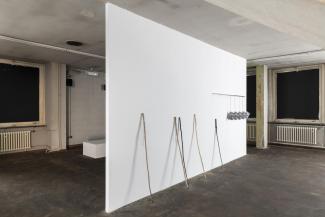
Leonie Nagel
Stadtguerilla-Kit (Wanderstock und Lesebuch Anarchismus), 2018
Wood, paint, laser-print, plastic, cotton string, steel
mixed dimensions
Courtesy of the artist.
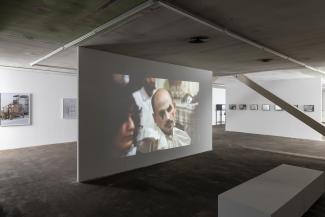
Innocence, Installation view. Works by Jumana Manna, Annette Kelm, and Marina Pinsky.
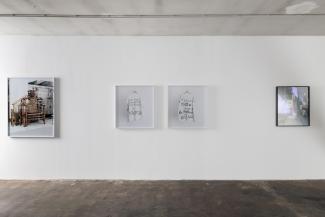
(left to right)
Annette Kelm
Jacquard Loom Deutsches Museum Munich, 2016
C-print, framed
115 x 95 cm
Institut für Zeitgeschichte-Archiv, Bestand Hannelore Mabry/ Bayerisches Archiv der Frauenbewegung, Signatur ED 900, Box 532 Körperüberhang: “Keine Mark, kein Dollar, kein Rubel für Waffen!” / “Frauen, Mütter, Feministen für Entwaffnung aller Länder!”, 2014
2 c-prints, framed
86.3 x 78.5 cm
Vitrine zur Geschichte der Frauenbewegung in Baden-Württemberg, Haus der Geschichte Baden-Württemberg, Stuttgart, 2013
c-print, framed
78 x 62.5 cm
Courtesy of the artist.
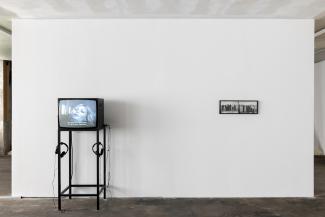
Innocence, Installation. Works by Ulrike Meinhof and Eberhard Itzenplitz and Martha Rosler.
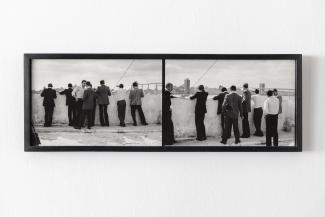
Martha Rosler
Soviet Sailors at El Morro, 1981
Silver gelatin print type LE print
20.30 cm x 60 cm
Courtesy of the artist.
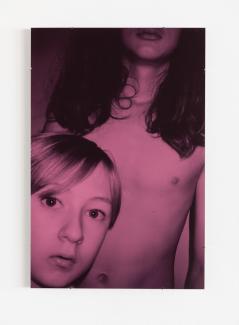
Tobias Madison
Dream House NYC XIII, 2018
Epson Sure Color Print mounted on Dibond, Pink Plexiglass
75 x 50 cm
Courtesy of the artist.
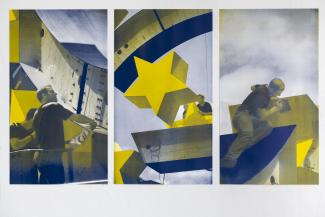
Esper Postma and Maurits Koster
Rising Stars #1, #2, and #3, 2019
Screen print on paper
120 x 67 cm each
Courtesy of the artists